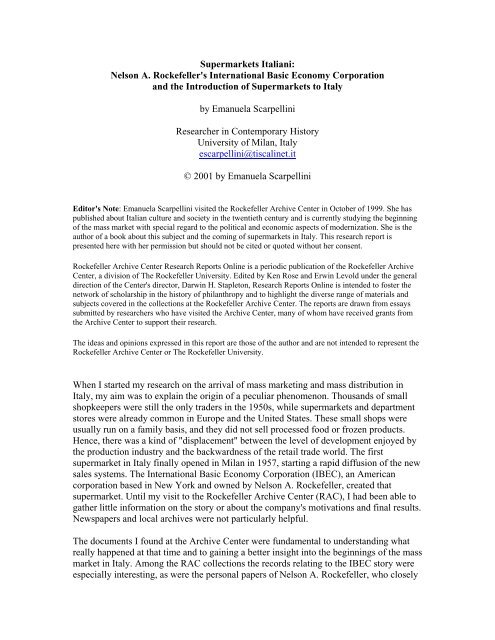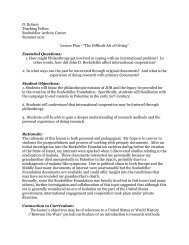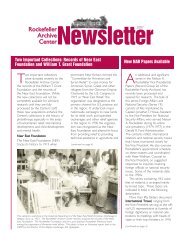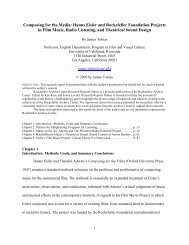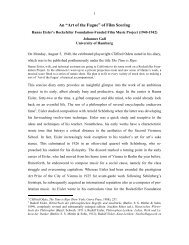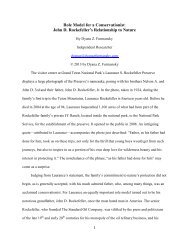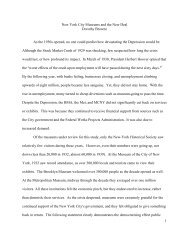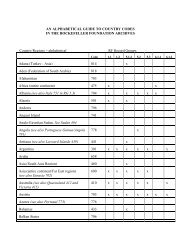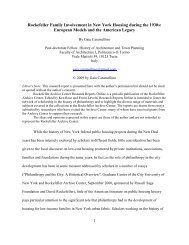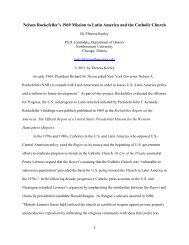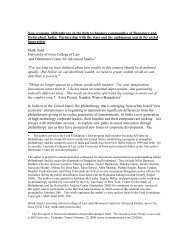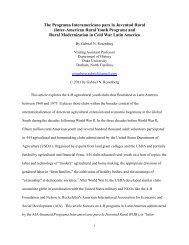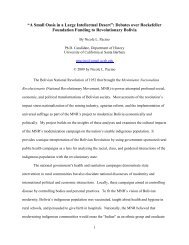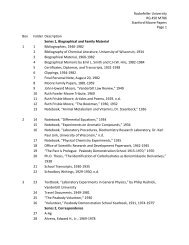Supermarkets Italiani: - The Rockefeller Archive Center
Supermarkets Italiani: - The Rockefeller Archive Center
Supermarkets Italiani: - The Rockefeller Archive Center
You also want an ePaper? Increase the reach of your titles
YUMPU automatically turns print PDFs into web optimized ePapers that Google loves.
<strong>Supermarkets</strong> <strong>Italiani</strong>:<br />
Nelson A. <strong>Rockefeller</strong>'s International Basic Economy Corporation<br />
and the Introduction of <strong>Supermarkets</strong> to Italy<br />
by Emanuela Scarpellini<br />
Researcher in Contemporary History<br />
University of Milan, Italy<br />
escarpellini@tiscalinet.it<br />
© 2001 by Emanuela Scarpellini<br />
Editor's Note: Emanuela Scarpellini visited the <strong>Rockefeller</strong> <strong>Archive</strong> <strong>Center</strong> in October of 1999. She has<br />
published about Italian culture and society in the twentieth century and is currently studying the beginning<br />
of the mass market with special regard to the political and economic aspects of modernization. She is the<br />
author of a book about this subject and the coming of supermarkets in Italy. This research report is<br />
presented here with her permission but should not be cited or quoted without her consent.<br />
<strong>Rockefeller</strong> <strong>Archive</strong> <strong>Center</strong> Research Reports Online is a periodic publication of the <strong>Rockefeller</strong> <strong>Archive</strong><br />
<strong>Center</strong>, a division of <strong>The</strong> <strong>Rockefeller</strong> University. Edited by Ken Rose and Erwin Levold under the general<br />
direction of the <strong>Center</strong>'s director, Darwin H. Stapleton, Research Reports Online is intended to foster the<br />
network of scholarship in the history of philanthropy and to highlight the diverse range of materials and<br />
subjects covered in the collections at the <strong>Rockefeller</strong> <strong>Archive</strong> <strong>Center</strong>. <strong>The</strong> reports are drawn from essays<br />
submitted by researchers who have visited the <strong>Archive</strong> <strong>Center</strong>, many of whom have received grants from<br />
the <strong>Archive</strong> <strong>Center</strong> to support their research.<br />
<strong>The</strong> ideas and opinions expressed in this report are those of the author and are not intended to represent the<br />
<strong>Rockefeller</strong> <strong>Archive</strong> <strong>Center</strong> or <strong>The</strong> <strong>Rockefeller</strong> University.<br />
When I started my research on the arrival of mass marketing and mass distribution in<br />
Italy, my aim was to explain the origin of a peculiar phenomenon. Thousands of small<br />
shopkeepers were still the only traders in the 1950s, while supermarkets and department<br />
stores were already common in Europe and the United States. <strong>The</strong>se small shops were<br />
usually run on a family basis, and they did not sell processed food or frozen products.<br />
Hence, there was a kind of "displacement" between the level of development enjoyed by<br />
the production industry and the backwardness of the retail trade world. <strong>The</strong> first<br />
supermarket in Italy finally opened in Milan in 1957, starting a rapid diffusion of the new<br />
sales systems. <strong>The</strong> International Basic Economy Corporation (IBEC), an American<br />
corporation based in New York and owned by Nelson A. <strong>Rockefeller</strong>, created that<br />
supermarket. Until my visit to the <strong>Rockefeller</strong> <strong>Archive</strong> <strong>Center</strong> (RAC), I had been able to<br />
gather little information on the story or about the company's motivations and final results.<br />
Newspapers and local archives were not particularly helpful.<br />
<strong>The</strong> documents I found at the <strong>Archive</strong> <strong>Center</strong> were fundamental to understanding what<br />
really happened at that time and to gaining a better insight into the beginnings of the mass<br />
market in Italy. Among the RAC collections the records relating to the IBEC story were<br />
especially interesting, as were the personal papers of Nelson A. <strong>Rockefeller</strong>, who closely
followed the whole IBEC experience in Italy. <strong>The</strong> Wayne G. Broehl papers also were<br />
very useful because they contained papers and documents collected by a professor at<br />
Dartmouth College who had written a book about IBEC in 1968 (<strong>The</strong> International Basic<br />
Economy Corporation. Washington, D.C.: International Planning Association, 1968).<br />
Here I found important evidence concerning the corporation's economic and financial<br />
status and also lively reports from different witnesses.<br />
Nelson A. <strong>Rockefeller</strong> created IBEC in 1946 with the aim of promoting economic<br />
development in Latin America after he had observed the poor living conditions in those<br />
countries during his service in the U.S. government. <strong>The</strong> new company was special<br />
insofar as it sought to combine philanthropic goals in developing the basic sectors of<br />
local economies with an adequate profit on the investment. Philanthropic organizations<br />
had all too often failed in their final aims, without in the least changing the situation of<br />
underdeveloped countries. And private corporations had often simply exploited local<br />
resources with little or no advantage to the local people. <strong>Rockefeller</strong>'s idea was to find a<br />
reasonable compromise by creating a company that could be useful for the host country<br />
in the long term while at the same time operating profitably.<br />
IBEC started operations in Venezuela and then Brazil in the fields of agriculture,<br />
fisheries, finance and industrial production. After ten years of operation IBEC decided to<br />
expand its activities into other countries and, following its company policy, looked to<br />
identify other economically underdeveloped regions or less-advanced fields within<br />
developed nations. After a detailed study of the state of trade in Europe, IBEC decided to<br />
establish a chain of five supermarkets in Italy with an initial investment of about<br />
US$300,000. "<strong>Supermarkets</strong> <strong>Italiani</strong>" were opened in Milan on April 13, 1957; IBEC<br />
held 51% of the shares of the new company, while some well-known Italian industrialists<br />
(Crespi, Caprotti, and Brunelli) controlled the rest.<br />
Richard W. Boogart was appointed Chief Executive Officer (CEO) of <strong>Supermarkets</strong><br />
<strong>Italiani</strong>. He already owned a chain of self-service stores and was an expert in the field of<br />
modern supermarkets. His positive assessment of the economic and social climate<br />
convinced him to start the first Italian self-service store in Milan.<br />
Changing the traditional pattern of Italian trade and creating a completely new model of<br />
food shopping was no easy task. <strong>The</strong> idea was to adapt the American experience to Italy<br />
in the same way that IBEC had already done to some extent in Latin America. But the<br />
initial difficulties exceeded expectations.<br />
<strong>The</strong> main problem was obtaining a license from the city authorities. <strong>The</strong> company had to<br />
wait seven months in order to get permission to open the first supermarket and almost<br />
one year for the two following stores. In addition, many small shopkeepers working in<br />
the immediate neighborhood filed suit against the new self-service stores, forcing closure.<br />
Some politicians publicly declared their support for small shopkeepers.<br />
It is possible to recreate the atmosphere and chain of events of the time through the<br />
interesting and accurate reports that Boogart sent almost daily to the New York
corporation. <strong>The</strong> disappointment provoked by the unexpected situation, as well as the<br />
strong determination to continue and to overcome all the obstacles, were all too apparent.<br />
<strong>The</strong> management was well aware that they faced a powerful organization of shopkeepers<br />
who were determined to fight the danger posed by supermarkets and mass distribution<br />
and who were willing to solicit the support of the ruling parties.<br />
But Boogart employed a powerful sales strategy that met with immediate success. He<br />
started a well-publicized newspaper campaign to advertise his commodities and<br />
organized numerous consumer initiatives, such as special offers and a daily prize for<br />
customers. A central factor in ensuring the success of such an approach was the<br />
availability of manufactured food -- something that could be not assured by the existing<br />
food industry, which was mostly composed of small artisan producers. <strong>Supermarkets</strong><br />
<strong>Italiani</strong> decided to set up its own production facilities in 1959 with a bakery, a pasta<br />
factory, and an ice-cream factory. <strong>The</strong> next year other facilities were added for roasting<br />
coffee and preparing meats and salami; these products proved to be better and cheaper<br />
than the traditional varieties. In addition, the Italian company started to buy eggs from an<br />
American company, Arbor Acres, which was affiliated with IBEC.<br />
<strong>The</strong> original solution to the problem of supply was a vertical integration capable of<br />
controlling the entire working process, from initial production to final packaging. This<br />
reduced costs and guaranteed the quality and character of the products. An organization<br />
that combined the offer of canned produce with fresh food was particularly appreciated<br />
by Italian customers. It was also a genuinely innovative move that anticipated the future<br />
development of supermarkets and of the food industry. Boogart's policy not only centered<br />
on cheap prices, but recognized that quality also was an all-important factor. <strong>The</strong><br />
outcome was a roaring success: in the first days that the stores were opened, the<br />
management was obliged to call in the police because of the huge response from the<br />
public, and sales quickly stabilized at a new all-time high for an Italian retailer.<br />
<strong>The</strong> problem of obtaining licenses continued to cause difficulties. Two other<br />
supermarkets had to postpone their opening dates, and local shopkeepers did all they<br />
could to oppose them with negative repercussions for the company's future plans. In<br />
response, <strong>Supermarkets</strong> <strong>Italiani</strong> changed its tactics. In 1961 it started to purchase Italian<br />
companies in the retail trade field; the number of its stores in Milan soon increased and<br />
two new facilities were opened in Florence. <strong>The</strong> results of the new company strategy<br />
were extremely positive and company profits increased after the early 1960s.<br />
Another major change took place during the same period. In 1960 Italian shareholders<br />
showed interest in buying the company. <strong>The</strong> negotiations were long and difficult, but in<br />
the end IBEC decided to sell off its operations in Italy and realized a healthy profit in the<br />
process. <strong>The</strong> deal was concluded for about US $2,700,000, whereas IBEC's total<br />
investment was calculated to be around US$ 425,000. <strong>The</strong> decision to sell was made<br />
partly because of the heavy losses accumulated by other companies in the IBEC group,<br />
and partly so as to obtain funds for the creation of a chain of supermarkets in Argentina,<br />
which Boogart was asked to direct. He accepted the position but also assured his
continued role as a technical advisor to the Italian company. Other Americans were<br />
appointed to run <strong>Supermarkets</strong> <strong>Italiani</strong>.<br />
IBEC's sojourn in Italy was very short. Within a few years the company had abandoned<br />
the Italian market to explore new business opportunities. But the organization that IBEC<br />
created proved to be longer lasting. <strong>Supermarkets</strong> <strong>Italiani</strong> had become a solid and wellknown<br />
company, built up a vast network, and gained practical skills and the know-how to<br />
realize future expansion. Under the new name of "Esselunga", the company continued to<br />
dominate the supermarket field for a long time and grew into one of the most important<br />
Italian corporations.<br />
<strong>The</strong> experiment initiated by IBEC in Italy led to some serious thinking. It is clear that the<br />
success of the first supermarkets was due to the massive economic, social and urban<br />
transformations that took place in Italy during the economic boom of the 1950s. But an<br />
external stimulus was required to induce major changes in the existing system of trade.<br />
<strong>The</strong> presence and the example of a powerful economic group from a more developed<br />
country was essential. It brought not only capital (it is noteworthy that the Italian partners<br />
purchased the company after just a few years), but also know-how and qualified staff.<br />
This experience was important not only from an economic point of view, but also<br />
because it set an example, provided a business model, and effectively promoted the idea<br />
of the supermarket among consumers. Diffusion of these new techniques of production,<br />
selling and marketing soon followed, so that many local entrepreneurs created similar<br />
companies in later years.<br />
<strong>The</strong> history of <strong>Supermarkets</strong> <strong>Italiani</strong> would seem to confirm the advantage of being the<br />
"first mover", able to choose the best locations, create a unique image, establish good<br />
relations with suppliers and customers, define new management models, select the bestqualified<br />
employees, etc. This "cumulative causation", as defined by Gunnar Myrdal in<br />
Economic <strong>The</strong>ory and Under-Developed Regions (Gerald Duckworth, 1957), allowed the<br />
company to lead the field for many years. <strong>Supermarkets</strong> <strong>Italiani</strong> succeeded in creating a<br />
unique image as the first and principal supermarket company: "differentiation" was its<br />
winning formula for success.<br />
<strong>The</strong> emergence of new forms of mass distribution, self-service stores, and supermarkets<br />
was not only an economic phenomenon: it also had important social and cultural<br />
consequences and influenced the way of life by becoming an integral part of modern<br />
society. Many tasks once performed within the family unit, such as the procurement,<br />
preparation and preservation of food, were now carried out by the trade system. <strong>The</strong><br />
advantages for the consumers were considerable: more available products, more freedom<br />
of choice, savings of money and time, and also a new sense of relaxation and amusement<br />
provided by the supermarket system.<br />
Ignored by the official political propaganda, a new pattern of consumption spread rapidly<br />
among the Italian people. Some contemporary observers did not consider this to be an<br />
important development because it only affected people's day-to-day lives and not socalled<br />
"higher" values or principles. But a new vision of the world had been born, a
vision modeled on the American way of life. And, as Richard S. Tedlow noted in New<br />
and Improved: <strong>The</strong> Story of Mass Marketing in America (Basic Books, 1990), this new<br />
vision had a deeper implication: the idea that freedom of choice as consumers was<br />
somehow linked to political freedom as citizens.


